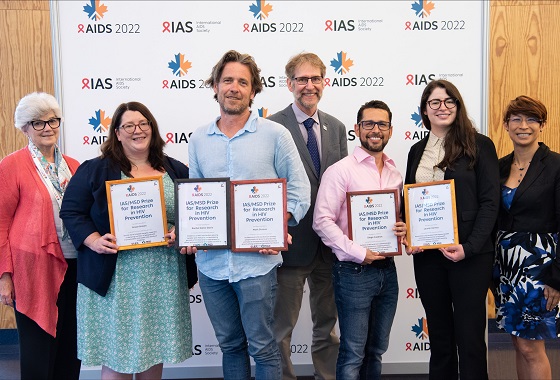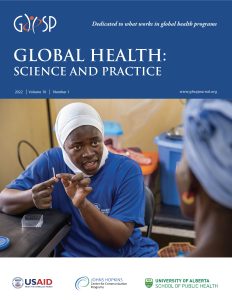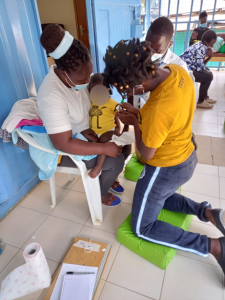News
August 4, 2022
Laurén Gómez awarded young investigator prizes at the 2022 International AIDS Society Conference
Categories: Awards, HIV, PrEP, Research

Laurén Gómez (second to right) stands with other winners selected for the IAS/MSD Prize for Research in HIV Prevention
At the 2022 International AIDS Society Conference, Laurén Gómez, a Research Coordinator with Global WACh, was selected as a winner of the Lange/van Tongeren Prize for Young Investigators (co-partnered with ANRS – France Recherche Nord & Sud Sida-HIV Hépatites) and the Prize for Research in HIV Prevention (co-partnered with MSD – Merck Sharpe & Dohme).
The young investigator awards support early career researchers who demonstrate innovation, originality, rationale and quality in the field of HIV research. The prizes are granted to the top-scoring abstract in each of the five tracks: Track A – Basic and translational research; Track B – Clinical research; Track C – Epidemiology and prevention research; Track D – Social and political research, law, policy and human rights; and Track E – Implementation research, economics, systems and synergies with other health and development sectors. The Prize for Research in HIV Prevention is given to the top-scoring abstracts with a focus on prevention research that addresses critical knowledge gaps and links new evidence to program priorities in the response to the HIV pandemic. Laurén received both awards for the Track C abstract titled, “Association of prenatal PrEP exposure with neurodevelopmental and growth outcomes beyond 24 months among Kenyan children.” (more…)
Researchers present latest scientific evidence at Pediatric HIV Workshop and AIDS 2022
Categories: Conferences, COVID-19, HIV, Research

Our researchers presented 12 poster abstracts and one oral presentation featuring the latest evidence from their studies, in relation to long-acting HIV treatment and prevention technologies, integrated and differentiated models of care, and monitoring and innovations in service delivery. Laurén Gómez, a Research Coordinator at UW, was selected as a winner of the Lange/van Tongeren Prize for Young Investigators (co-partnered with ANRS – France Recherche Nord & Sud Sida-HIV Hépatites) and the Prize for Research in HIV Prevention (co-partnered with MSD – Merck Sharpe & Dohme). Learn more about Laurén’s analysis that aimed to address safety gaps in the impacts of prenatal pre-exposure prophylaxis (PrEP) on growth and development in early childhood. See a list of accepted abstracts for both scientific gatherings below.
August 3, 2022
Mobile WACh NEO randomized controlled trial achieves milestone to enroll 5,020 research participants
Categories: Family Planning, Research
Newborn care practices and interventions are available to support neonatal survival, but coverage remains a challenge in sub-Saharan Africa, where neonatal mortality is unacceptably high. Many newborns continue to die at home without health care services being sought. The reasons are multifactorial, at the societal, health system, and family levels. Delays recognizing illness and deciding to seek care contribute to up to 80% of neonatal and child deaths. (more…)
June 29, 2022
New publication in the Lancet Microbe on CRISPR detection of tuberculosis in adults and children with HIV.
Categories: HIV and Co-Infections, Publication
Mycobacterium tuberculosis (TB) remains a major factor in global morbidity and mortality, especially for adults and children with HIV. Coinfection of HIV and tuberculosis is uniquely dangerous, as the depression of normal immune response to infection in persons with HIV can lead to both severe illness and the underdiagnosis of TB when using sputum-based assays. Collecting sputum from young children presents further issues. A new molecular diagnostics study by UW Global WACh in collaboration with Tulane University and other partners including Baylor College of Medicine, Baylor Children’s Foundation-Eswatini, University of Nairobi and Kenyatta National Hospital in Kenya, to study the effectiveness of CRISPR-based assay detection of M. tuberculosis cell-free DNA (Mtb-cfDNA) in seropositive adults and children was published in The Lancet Microbe May 2022 edition. (more…)
May 25, 2022
New publication on childhood mortality during and after acute illness in Africa and South Asia in the Lancet Global Health
Categories: Gut Health and Child Survival, Publication, Research
The April 2022 publication of the Lancet Global Health featured a new publication by CHAIN Network researchers at UW’s Global WACh Research Center and our international partners – “Childhood mortality during and after acute illness in Africa and South Asia” a prospective cohort study”. The study aimed to investigate the rates of and associations behind deaths in hospitalized children across nine hospitals in six countries in sub-Saharan Africa and South Asia. The study included 3,101 children and their caregivers, and revealed that out of the 350 deaths recorded, 48% were within six months of discharge from the hospital. (more…)
March 29, 2022
New publication on implementation of HIV retesting guidelines for pregnant and postpartum women in Kenya
Categories: HIV, Publication, Uncategorized
 The February 2022 edition of Global Health: Science and Practice features a new publication by UW Global WACh students, Monalisa Penumetsa (DGH MPH alumni) and Epidemiology PhD student Jillian Neary, and faculty (Drs. Alison Drake and Grace John-Stewart)– “Implementation of HIV Retesting During Pregnancy and Postpartum in Kenya: A Cross Sectional Study.” The study aimed to measure the prevalence of maternal HIV retesting in Kenya, and HIV incidence among Kenyan mothers. (more…)
The February 2022 edition of Global Health: Science and Practice features a new publication by UW Global WACh students, Monalisa Penumetsa (DGH MPH alumni) and Epidemiology PhD student Jillian Neary, and faculty (Drs. Alison Drake and Grace John-Stewart)– “Implementation of HIV Retesting During Pregnancy and Postpartum in Kenya: A Cross Sectional Study.” The study aimed to measure the prevalence of maternal HIV retesting in Kenya, and HIV incidence among Kenyan mothers. (more…)
March 23, 2022
Safe and dependable outpatient treatment for infants experiencing malnourishment
Categories: Children, Nutrition
Global WACh is pleased to feature a new publication: “Community-based management of acute malnutrition for infants under 6 months of age is safe and effective: analysis of operational data” by Global WACh faculty Dr. Indi Trehan and UW coauthors Drs. Maeve M Woeltje and Mark J Manary, was featured in Public Health Nutrition December 2021 edition. The study utilized operational data from outpatient feeding clinics in Malawi, which was analyzed in order to evaluate the success of infant recovery under the community-based management of acute malnutrition (CMAM) model. (more…)
Tunza Mwana study researchers enroll 350 participants amid COVID-19 limitations
Categories: HIV

Global WACh’s Tunza Mwana study recently celebrated an important milestone. The team has been working in Migori County, Kenya, throughout the COVID-19 pandemic to enroll mother-baby pairs in a long term, prospective cohort study. sponsored by the National Institutes of Health and led by Christine McGrath, Grace Aldrovandi, and Benson Singa. The study was created to evaluate the association between maternal HIV infection and infant health outcomes through breast-milk mediated pathways, which can help practitioners determine the best possible care for HIV positive mothers and their children. (more…)
February 8, 2022
New PhD grad Nuttada Panpradist first Bioengineering Student to Complete Global WACh Certificate
Categories: Certificate Program
 Congratulations, Dr. Nuttada Panpradist, on the completion of your PhD, as well as being the first Bioengineering student to also complete the Global WACh Certificate program! Dr. Panpradist’s achievements exemplify the diverse range of skills and experiences necessary in the Global Health community.
Congratulations, Dr. Nuttada Panpradist, on the completion of your PhD, as well as being the first Bioengineering student to also complete the Global WACh Certificate program! Dr. Panpradist’s achievements exemplify the diverse range of skills and experiences necessary in the Global Health community.
Read her profile article by the Department of Bioengineering here.
December 13, 2021
Global WACh welcomes new staff to the UW team
Categories: Uncategorized
We are pleased to introduce the newest additions to our UW team! These team members provide crucial administrative, research, and data management support to individual studies and the Center as a whole.
Previous page Next page